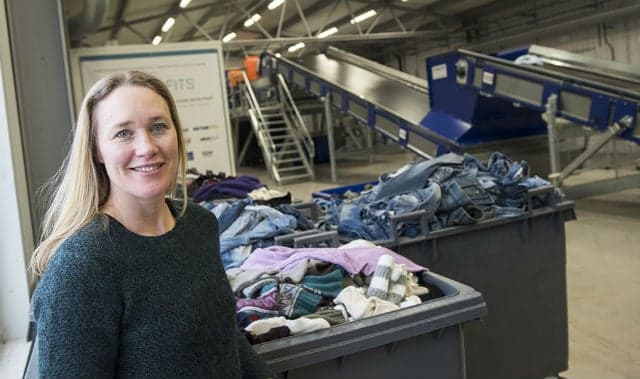Malmö to host groundbreaking textile recycling plant

The world's first automatic textile recycling facility will be built in Malmö, in a major step forward in the move towards bringing a circular economy to one of the world's most environmentally damaging industries.
The facility, which uses optic sensors to identify different textile types, will open in summer 2020 next to the existing recycling centre in Malmö's Northern Harbour, the IVL Swedish Environmental Research Institute said in a statement.
Maria Elander, who is leading the project for IVL, told the Sydsvenskan newspaper that industrialized sorting was "the missing link between collection and quality recycling".
"Automatic sorting processes are required to be able to efficiently sort the large amounts of textile rubbish which cannot be recycled and which is not suitable for fibre to fibre recycling," she said.
The aim is to use the recycled textiles to make padding, insulation, and cloth for industrial cleaning, slowly increasing the amount of textiles recycled from 3,000 to 16,000 tonnes over five years.
The facility will be operated by Sysav, the recycling company owned owned by 14 municipalities in Skåne, which today operates the site.
The project marks the third phase of the Swedish Innovation Platform for Textile Sorting (Siptex), and comes after a successful pilot project in Avesta.
The platform is a joint venture between the Swedish Environmental Research Institute and 21 other partners, including major Swedish fashion chains, and local municipalities, and has received 22m SEK in funding from Sweden's state R&D agency Vinnova.
Elander told Sydsvenskan that Malmö's position close to European markets made it a good location.
"Malmö is strategically well situated in the Öresund region with a relatively large number of inhabitants and large amounts of waste," she said. "In addition, it is close to Danish quantities [of textile waste]. The closeness to the continent is important."
Elander said that Sysav would be paid to recycle some of the waste, but would also pay to receive higher quality textiles.
Comments
See Also
The facility, which uses optic sensors to identify different textile types, will open in summer 2020 next to the existing recycling centre in Malmö's Northern Harbour, the IVL Swedish Environmental Research Institute said in a statement.
Maria Elander, who is leading the project for IVL, told the Sydsvenskan newspaper that industrialized sorting was "the missing link between collection and quality recycling".
"Automatic sorting processes are required to be able to efficiently sort the large amounts of textile rubbish which cannot be recycled and which is not suitable for fibre to fibre recycling," she said.
The aim is to use the recycled textiles to make padding, insulation, and cloth for industrial cleaning, slowly increasing the amount of textiles recycled from 3,000 to 16,000 tonnes over five years.
The facility will be operated by Sysav, the recycling company owned owned by 14 municipalities in Skåne, which today operates the site.
The project marks the third phase of the Swedish Innovation Platform for Textile Sorting (Siptex), and comes after a successful pilot project in Avesta.
The platform is a joint venture between the Swedish Environmental Research Institute and 21 other partners, including major Swedish fashion chains, and local municipalities, and has received 22m SEK in funding from Sweden's state R&D agency Vinnova.
Elander told Sydsvenskan that Malmö's position close to European markets made it a good location.
"Malmö is strategically well situated in the Öresund region with a relatively large number of inhabitants and large amounts of waste," she said. "In addition, it is close to Danish quantities [of textile waste]. The closeness to the continent is important."
Elander said that Sysav would be paid to recycle some of the waste, but would also pay to receive higher quality textiles.
Join the conversation in our comments section below. Share your own views and experience and if you have a question or suggestion for our journalists then email us at [email protected].
Please keep comments civil, constructive and on topic – and make sure to read our terms of use before getting involved.
Please log in here to leave a comment.